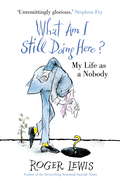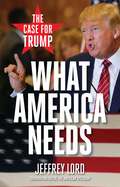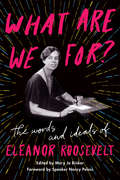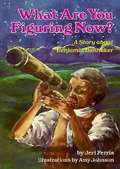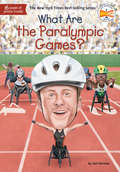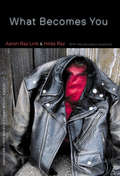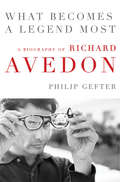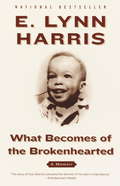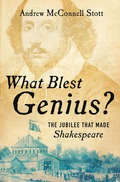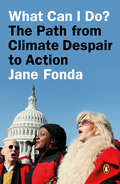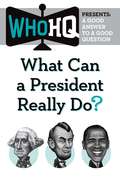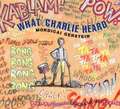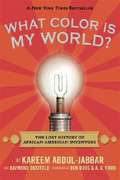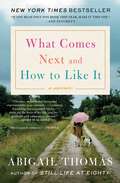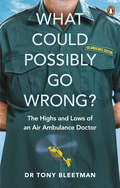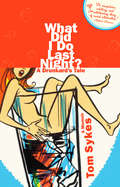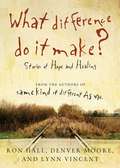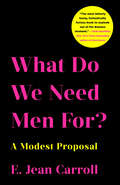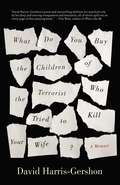- Table View
- List View
What Am I Still Doing Here?: My Life as Me
by Roger LewisThis is Roger Lewis at his best: more cantankerous and curmudgeonly wit and musings about the pointlessness of life. Dark, witty and hilarious, Roger Lewis has a real way with words.
What America Needs: The Case for Trump
by Jeffrey LordHe's controversial, colorful, and occasionally crass. But there's no denying that billionaire businessman Donald Trump has struck a chord with the American electorate. <P><P>Right now the economy is floundering; college students are protesting; undocumented immigrants are settling in; ISIS is growing; and Russia is plotting. It's time for a bold leader in the White House. It's time, CNN contributor Jeffrey Lord says, for President Donald Trump. <P><P>In What America Needs, Lord makes a powerful case that Trump--often denigrated even by other Republicans as too outrageous for the White House--is actually exactly the president our country needs right now: one who will reverse the damages done during the Obama administration and do what it takes to make America great again.
What Are We For?: The Words and Ideals of Eleanor Roosevelt
by Eleanor RooseveltFrom one of the world’s most celebrated and admired public figures, Eleanor Roosevelt, a collection of her most treasured sayings—the perfect gift for Mother’s Day, graduation, and a new generation of feminists.With a foreword by Speaker Nancy PelosiNo one can make you feel inferior without your consent. We’ve all heard this powerful Eleanor Roosevelt adage—it is, perhaps, one of her best known. A wise leader, she knew the power of words, and throughout her work as First Lady, a UN representative, and advocate for human rights, women, youth, minorities, and workers, she was a prolific writer and speaker. Eleanor’s wise words on government, race and ethnicity, freedom, democracy, economics, women and gender, faith, children, war, peace, and our everyday lives leap off the page in memorable quotations such as:· One's philosophy is not best expressed in words; it is expressed in the choices one makes.· Progress is rarely achieved by indifference.· I am convinced that every effort must be made in childhood to teach the young to use their own minds. For one thing is sure: If they don’t make up their minds, someone will do it for them. · Unless people are willing to face the unfamiliar they cannot be creative in any sense, for creativity always means the doing of the unfamiliar, the breaking of new ground.…and these are just a few. At this politically and culturally divided moment in our nation’s history, Eleanor Roosevelt’s quotes have an even deeper resonance—as moving and insightful as they are timely. What Are We For? is a celebration of a cultural icon, and a powerful reminder of Eleanor Roosevelt’s extraordinary contributions to our country, and the world.
What Are You Figuring Now? A Story about Benjamin Banneker
by Jeri Chase FerrisA biography of the Afro-American farmer and self-taught mathematician, astronomer, and surveyor for the new capital city of the United States in 1791, who also calculated a successful almanac notable for its preciseness.
What Are You?: Voices of Mixed-Race Young People
by Pearl Fuyo GaskinsIn the past three decades, the number of interracial marriages in the United States has increased by more than 800 percent. Now over four million children and teenagers do not identify themselves as being just one race or another. Here is a book that allows these young people to speak in their own voices about their own lives. What Are You? is based on the interviews the author made over the past two years with mixed-race young people around the country. These fresh voices explore issues and topics such as dating, families, and the double prejudice and double insight that comes from being mixed, but not mixed-up.
What Are the Paralympic Games? (What Was?)
by Gail Herman Who HQIt's time to cheer for the inspiring athletes of the Paralympic Games! As the Opening Ceremony for the 1948 Summer Olympic Games commenced in London, a similar sporting competition was taking place a few miles away. But the men at Stoke Mandeville weren't your typical athletes. They were paralyzed World War II veterans. The games at Stoke Mandeville were so successful that they would eventually lead evolve into the Paralympics. Participants from all around the world vie for the gold medal in a variety of sports, including archery, basketball, swimming, speed skating, and ice hockey. Author Gail Herman highlights their achievements, describes how these athletes train--both mentally and physically--for the games, and gives the reader a better understanding of what makes the Paralympic Games one of the world's most viewed sporting events.
What Becomes You
by Aaron Raz Link Hilda Raz“Being a man, like being a woman, is something you have to learn,” Aaron Raz Link remarks. Few would know this better than the coauthor of What Becomes You, who began life as a girl named Sarah and twenty-nine years later began life anew as a gay man. Turning from female to male and from teaching scientist to theatre performer, Link documents the extraordinary medical, social, legal, and personal process involved in a complete identity change. Hilda Raz, a well-known feminist writer and teacher, observes the process as both an “astonished” parent and as a professor who has studied gender issues. All these perspectives come into play in this collaborative memoir, which travels between women’s experience and men’s lives, explores the art and science of changing sex, maps uncharted family values, and journeys through a world transformed by surgery, hormones, love, and... clown school. Combining personal experience and critical analysis, the book is an unusual—and unusually fascinating—reflection on gender, sex, and the art of living.
What Becomes You (American Lives)
by Aaron Raz Link Hilda Raz&“Being a man, like being a woman, is something you have to learn,&” Aaron Raz Link remarks. Few would know this better than the coauthor of What Becomes You, who began life as a girl named Sarah and twenty-nine years later began life anew as a gay man. Turning from female to male and from teaching scientist to theatre performer, Link documents the extraordinary medical, social, legal, and personal processes involved in a complete identity change. Hilda Raz, a well-known feminist writer and teacher, observes the process as both an &“astonished&” parent and as a professor who has studied gender issues. All these perspectives come into play in this collaborative memoir, which travels between women&’s experience and men&’s lives, explores the art and science of changing sex, maps uncharted family values, and journeys through a world transformed by surgery, hormones, love, and . . . clown school. Combining personal experience and critical analysis, the book is an unusual—and unusually fascinating—reflection on gender, sex, and the art of living.
What Becomes a Legend Most: A Biography of Richard Avedon
by Philip GefterThe first definitive biography of Richard Avedon, a monumental photographer of the twentieth century, from award-winning photography critic Philip Gefter.In his acclaimed portraits, Richard Avedon captured the iconic figures of the twentieth century in his starkly bold, intimately minimal, and forensic visual style. Concurrently, his work for Harper's Bazaar and Vogue transformed the ideals of women's fashion, femininity, and culture to become the defining look of an era. Yet despite his driving ambition to gain respect in the art world, during his lifetime he was condescendingly dismissed as a "celebrity photographer."What Becomes a Legend Most is the first definitive biography of this luminary—an intensely driven man who endured personal and professional prejudice, struggled with deep insecurities, and mounted an existential lifelong battle to be recognized as an artist. Philip Gefter builds on archival research and exclusive interviews with those closest to Avedon to chronicle his story, beginning with Avedon’s coming-of-age in New York between the world wars, when cultural prejudices forced him to make decisions that shaped the course of his life.Compounding his private battles, Avedon fought to be taken seriously in a medium that itself struggled to be respected within the art world. Gefter reveals how the 1950s and 1960s informed Avedon’s life and work as much as he informed the period. He counted as close friends a profoundly influential group of artists—Leonard Bernstein, Truman Capote, James Baldwin, Harold Brodkey, Renata Adler, Sidney Lumet, and Mike Nichols—who shaped the cultural life of the American twentieth century. It wasn't until Avedon's fashion work was exhibited at the Metropolitan Museum of Art in the late 1970s that he became a household name.Balancing glamour with the gravitas of an artist's genuine reach for worldy achievement—and not a little gossip—plus sixteen pages of photographs, What Becomes a Legend Most is an intimate window into Avedon's fascinating world. Dramatic, visionary, and remarkable, it pays tribute to Avedon's role in the history of photography and fashion—and his legacy as one of the most consequential artists of his time.
What Becomes of the Brokenhearted: A Memoir
by E. Lynn HarrisFor almost a decade, beloved storyteller E. Lynn Harris has welcomed you into his family with his passionate, warm and trail-blazing novels. Now, he invites you into the most intimate world ever--his own.Since his first book Invisible Life was published in the early 1990s, New York Times bestselling author E. Lynn Harris has wowed, charmed and romanced millions of readers. As a master storyteller, E. Lynn Harris has created an intimate and glamorous world centered around his signature themes of love, friendship and family. People all over the world have fallen in love with his characters and laughed and cried with them. Now, in his most daring act yet, E. Lynn Harris writes the memoir of his life-from his childhood in Arkansas as a closeted gay boy through his struggling days as a self-published author to his rise as a New York Times bestselling author. In What Becomes of the Brokenhearted, E. Lynn Harris shares an extraordinary life touched by loneliness and depression, but more important, he reveals the triumphant life of a small-town dreamer who was able through writing to make his dreams-and more-come true.
What Blest Genius?: The Jubilee That Made Shakespeare
by Andrew McConnell StottThe remarkable, ridiculous, rain-soaked story of Shakespeare’s Jubilee: the event that established William Shakespeare as the greatest writer of all time. The remarkable, ridiculous, rain-soaked story of Shakespeare’s Jubilee: the event that established William Shakespeare as the greatest writer of all time. In September 1769, three thousand people descended on Stratford-upon-Avon to celebrate the artistic legacy of the town’s most famous son, William Shakespeare. Attendees included the rich and powerful, the fashionable and the curious, eligible ladies and fortune hunters, and a horde of journalists and profiteers. For three days, they paraded through garlanded streets, listened to songs and oratorios, and enjoyed masked balls. It was a unique cultural moment—a coronation elevating Shakespeare to the throne of genius. Except it was a disaster. The poorly planned Jubilee imposed an army of Londoners on a backwater hamlet peopled by hostile and superstitious locals, unable and unwilling to meet their demands. Even nature refused to behave. Rain fell in sheets, flooding tents and dampening fireworks, and threatening to wash the whole town away. Told from the dual perspectives of David Garrick, who masterminded the Jubilee, and James Boswell, who attended it, What Blest Genius? is rich with humor, gossip, and theatrical intrigue. Recounting the absurd and chaotic glory of those three days in September, Andrew McConnell Stott illuminates the circumstances in which William Shakespeare became a transcendent global icon.
What Can I Do?: My Path from Climate Despair to Action
by Jane FondaA call to action from Jane Fonda, one of the most inspiring activists of our time, urging us to wake up to the looming disaster of climate change and equipping us with the tools we need to join her in protest <p><p> "This is the last possible moment in history when changing course can mean saving lives and species on an unimaginable scale. It's too late for moderation." <p> In the fall of 2019, frustrated with the obvious inaction of politicians and inspired by Greta Thunberg, Naomi Klein, and student climate strikers, Jane Fonda moved to Washington, D.C., to lead weekly climate change demonstrations on Capitol Hill. On October 11, she launched Fire Drill Fridays, and has since led thousands of people in nonviolent civil disobedience, risking arrest to protest for action. In What Can I Do?, Fonda weaves her deeply personal journey as an activist alongside conversations with and speeches by leading climate scientists and inspiring community organizers, and dives deep into the issues, such as water, migration, and human rights, to emphasize what is at stake. Most significantly, Fonda equips us all with the tools we need to join her in protest, so that everyone can work to combat the climate crisis. <p> No stranger to protest, Fonda's life has been famously shaped by activism. And now she is once again galvanizing the public to take to the streets. Many are already aware of the looming disaster of climate change and realize that a moral responsibility rests on our shoulders. In 2019, we saw atmospheric concentrations of greenhouse gases hit the highest level ever recorded in human history, and our window of opportunity to act is quickly closing. We are facing a climate crisis, but we're also facing an empathy crisis and an inequality crisis; the surge of protests over police violence against black Americans has once again highlighted the links between racism and environmental degradation in our country. It isn't only earth's life-support systems that are unraveling. So too is our social fabric. This is going to take an all-out war on drilling and fracking and deregulation and racism and misogyny and colonialism and despair all at the same time. <p> As Annie Leonard, executive director of Greenpeace USA and Fonda's partner in developing Fire Drill Fridays, has declared, "Change is inevitable; by design, or by disaster." Together, we can commandeer change for the positive—but it will require collective actions taken by social movements on an unprecedented scale. The problems we face now require every one of us to join the fight. The fight for not only our immediate future, but for the future of generations to come.
What Can You Do With Your Will Power
by Russell H. ConwellIn "What You Can Do With Your Will Power," Russell H. Conwell, the esteemed Baptist minister, lawyer, and founder of Temple University, explores the immense power of the human will and its critical role in achieving personal and professional success. This enlightening book offers practical insights and motivational wisdom that inspire readers to harness their inner strength and transform their lives.Conwell delves into the nature of willpower, illustrating how it can be developed and utilized to overcome obstacles, achieve goals, and realize one’s full potential. He shares inspiring stories and practical advice on how to cultivate a strong will, maintain focus, and persevere in the face of challenges.Key themes include:The Nature of Will Power: Conwell defines willpower as the inner strength and determination that drives individuals to pursue their goals relentlessly. He emphasizes that everyone possesses this power and can cultivate it through conscious effort and practice.Cultivating Will Power: The book provides practical strategies for strengthening willpower, such as setting clear goals, developing disciplined habits, and maintaining a positive mindset. Conwell encourages readers to practice self-control and stay committed to their objectives.Overcoming Obstacles: Conwell discusses the importance of resilience and perseverance in the face of adversity. He offers guidance on how to stay motivated and focused, even when confronted with setbacks and difficulties.The Role of Will Power in Success: Through compelling anecdotes and real-life examples, Conwell demonstrates how willpower has been a decisive factor in the achievements of successful individuals. He highlights the transformative impact of a determined and focused mind.Balancing Will Power and Flexibility: While emphasizing the importance of strong willpower, Conwell also advises on the need for flexibility and adaptability. "What You Can Do With Your Will Power" is an inspiring and practical guide for anyone looking to strengthen their resolve and achieve their ambitions. Russell H. Conwell’s timeless wisdom and motivational insights provide readers with the tools they need to unlock their inner strength and reach their fullest potential.
What Can a President Really Do?: A Good Answer to a Good Question
by Who HqDirect from Who HQ, the team that brings you the New York Times Best-Selling Who Was? biography series, comes Who HQ Presents. These short illustrated e-Books provide quick, simple answers to the important questions being asked today about politics, social issues, the environment, and more!How much power does a US president really have? Wonder no more: Who HQ Presents the answers to what presidents can do on their own, how the three branches of government hold one another in check, and what executive orders presidents have signed in the past.
What Charlie Heard
by Mordicai GersteinDescribes the life of American composer Charles Ives, who wrote music which expressed all the sounds he heard in the world, but which was not well received during his lifetime.
What Color is my World: The Lost History of African-American Inventors,
by Raymond Obstfeld Kareem Abdul-JabbarWhile twins Ella and Herbie help the handyman Mr. Mital work on their new home, he tells them about such inventors as Granville Woods, Dr. Henry T. Sampson, and James West, giving them a new view of their heritage as African Americans.
What Color is the Sun
by Kenneth JerniganA Kernel Book, this has life stories from 14 blind people.
What Comes Next and How to Like It: A Memoir
by Abigail ThomasThe New York Times bestseller from the beloved author of A Three Dog Life—an exhilarating, superbly written memoir on friendship, family, creativity, tragedy, and the richness of life: “If you only read one book this year, make it this one” (Ann Patchett).In her bestselling memoir A Three Dog Life, Abigail Thomas wrote about the devastating loss of her husband. In What Comes Next and How to Like It, “a keenly observed memoir…Thomas writes of the changes aging brings us all and of coping through love: of family, dogs, a well-turned phrase. She is superb company” (People). Thomas was startled to overhear herself described as “a nice old lady with a tattoo,” because she thinks of herself as not nice, not old, nor a lady. But she has wondered: what comes next? What comes after the death of a spouse? What form does a lifelong friendship take after deepest betrayal? How does a mother cope with her child’s dire illness? Or the death of a cherished dog? And how to like it? How to accept, appreciate, enjoy? How to find solace and pleasure? How to sustain and be sustained by our most trusted, valuable companions? At its heart, What Comes Next and How to Like It is about the complicated friendship between Thomas and a man she met thirty-five years ago—a rich bond that has lasted through marriages, child-raising, and the vicissitudes and tragedies of life. “After all,” she writes, “there are those people we love, and then there are those we recognize. These are the unbreakable connections.” Exquisitely observed, lush with sentences you will read over and over again, What Comes Next and How to Like It “is a beautifully felt, deeply moving memoir, the best work yet by a woman who has already done some of the best work in the field. Abigail Thomas is the Emily Dickinson of memoirists, and so much of this book’s wisdom is between the lines and in the white spaces. It may only take you two days to read, but the impact will stay with you for a long, long time” (Stephen King). This is a glorious guide to living imperfectly and exuberantly.
What Could Possibly Go Wrong?: The Highs and Lows of an Air Ambulance Doctor
by Dr Tony Bleetman'During open-chest resuscitations, I've held a non-beating, recently stilled human heart in my hands. And, should you ever get to hold one, you will find the human heart to be rubbery and shockingly light.'What Could Possibly Go Wrong? is a report from the front line of emergency medicine, the first ever account of what it is like to work as an air ambulance doctor. Whether describing cutting through a patient's breastbone to plug a stab wound or barrel rolling a light aircraft at 5,000 feet, Tony Bleetman captures the sheer adrenaline of racing through the sky to save lives. You will learn how to land a helicopter on the side of a mountain, what it means to encounter death every day, and how to perform a tracheotomy in real life (clue: it doesn’t involve a ball-point pen).Funny, shocking and moving, What Could Possibly Go Wrong? is a glimpse at a world where the wrong decision can mean the difference between life and death.Originally published as You Can't Park There: The Highs and Lows of an Air Ambulance Doctor.
What Daddy Did: The shocking true story of a little girl betrayed
by Donna FordIn this haunting and frank account, Donna Ford, bestselling author of The Step Child, returns to the horrific abuse she suffered at the hands of her stepmother. As a tiny girl of five, and for six long years, Donna was physically, mentally and sexually abused. She was starved, beaten and 'loaned out' to neighbours who raped and molested her ... and throughout her father stood by and did nothing. When her stepmother finally left the family home, Donna dreamed of a normal childhood in which she would be taken care of by the man who had, up until this point, failed her. But it was not to be. By telling the whole story of her Edinburgh childhood, Donna tries to understand why the man who should have loved her the most - her own father - was the one who deceived her the most, by continuing to allow men to abuse her. Instead of finding a future of love and happiness, Donna was once again thrust into a living nightmare of exploitation and betrayal by those who should have wrapped her up in their love. While this is a true story of appalling child abuse, it is also a tale of how exhilaration, tenderness and self-development can flourish despite childhood horrors. We take a journey with Donna to discover the woman she has become: a devoted mother of three and a talented artist and writer.
What Did I Do Last Night?: A Drunkard's Tale
by Tom SykesWhen Tom Sykes landed his dream job as the New York Post's bar columnist and nightlife reporter, he turned his long-standing drinking problem into a vocation. His memoir is a funny, thrilling, and ruthlessly honest exhumation of his drinking life and a candid account of his first 90 days without alcohol.Tom traces his alcoholism back to his British boyhood at Eton College, England's oldest and most exclusive boarding school, where the boys had to wear tail suits to class and there was a school pub. He delves into his aristocratic family's well-documented fondness for the bottle and covers his own drinking apprenticeship as a trainee journalist on London's famously alcohol-sodden newspapers.Whether he is getting arrested for drunk driving at the age of 15, climbing naked into his friends' and colleagues' beds, or simply trying to file an emergency front-page update while reeling from a cocktail of Ecstacy and magic mushrooms, Tom takes the reader on an addictive journey into the insanity of intoxication—all too often followed by a mossy tongue, a dull headache, and one burning question: "What the hell did I do last night?"
What Difference Do It Make? Stories of Hope and Healing
by Ronald E. Hall Denver Moore Lynn VincentA modern-day slave and an international art dealer are bound together by a dying woman's faith. Will Ron, the art dealer, be able to embrace Denver, who's been homeless for almost 20 years? Will Denver learn to trust a white man? There's pain and laughter, doubt and tears, and in the end a triumphant story.
What Do We Know About Alien Abduction? (What Do We Know About?)
by Kirsten Mayer Who HQThe What Do We Know About? series explores the mysterious, the unknown, and the unexplained. Are there really aliens visiting Earth to observe and interact with humans?In 1961, Betty and Barney Hill claimed to have experienced a bizarre night that included extraterrestrials, flying saucers, and a few lost hours during which they could recall very little until they underwent hypnosis. Their mysterious story was just the first of many that have been told by people who have since come forward with their own similar experiences. Although there are thousands of people who claim to have experienced alien abduction, much of the world remains skeptical. Is alien abduction a real phenomenon that has affected people worldwide or just an imagined shared experience? Could the US government be working to cover up these stories? Here are the the facts about what we really know about Alien Abduction.
What Do We Need Men For?: A Modest Proposal
by E. Jean CarrollA The Washington Post 50 notable works of nonfiction in 2019"A work of comic genius." —Mary Norris, The New Yorker“Darkly humorous and deadly serious.” –Sibbie O'Sullivan, Washington Post“A compulsively interesting feminist memoir.” –Virginia Heffernan, Slate"Somehow hilarious, in the way that only E. Jean could have written it" –Leigh Haber, Oprah MagazineAmerica's longest running advice columnist goes on the road to speak to women about hideous men and whether we need them.When E. Jean Carroll—possibly the liveliest woman in the world and author of the “Ask E. Jean” advice column in Elle Magazine, realized that her eight million readers and question-writers all seemed to have one thing in common—problems caused by men—she hit the road. Crisscrossing the country with her blue-haired poodle, Lewis Carroll, E. Jean stopped in every town named after a woman between Eden, Vermont and Tallulah, Louisiana to ask women the crucial question: What Do We Need Men For?E. Jean gave her rollicking road trip a sly, stylish turn when she deepened the story, creating a list called “The Most Hideous Men of My Life,” and began to reflect on her own sometimes very dark history with the opposite sex. What advice would she have given to her past selves—as Miss Cheerleader USA and Miss Indiana University? Or as the fearless journalist, television host, and eventual advice columnist she became? E. Jean intertwines the stories of the fascinating people she meets on her road trip with her “horrible history with the male sex” (including mafia bosses, media titans, boyfriends, husbands, a serial killer, and a president), creating a decidedly dark yet hopeful, hilarious, and thrilling narrative. Her answer to the question What Do We Need Men For? will shock men and delight women.
What Do You Buy the Children of the Terrorist Who Tried to Kill Your Wife? A Memoir: A Memoir
by David Harris-GershonDavid Harris-Gershon and his wife, Jamie, moved to Jerusalem full of hope. Then, in the midst of a historic cease-fire between Israel and the Palestinians, a bomb shrieked through Hebrew University’s cafeteria. Jamie was hurled across the room, her body burned and sliced with shrapnel; the friends sitting next to her were instantly killed. David was desperate for answers—why now? why here? why my wife? But when a doctor handed him some shrapnel removed from Jamie’s body, he refused to accept that this bit of metal made him “one of us”—another traumatized victim who would never be able to move on. Instead, he dug into Israeli government records to uncover what triggered the attack, then returned to East Jerusalem to meet the terrorist and his family. <P><P> Part memoir, part political thriller, part exposé of the conduct of the peace process, this fearless debut confronts the personal costs of the Middle East conflict—and reveals the human capacity for recovery and reconciliation, no matter the circumstance.
